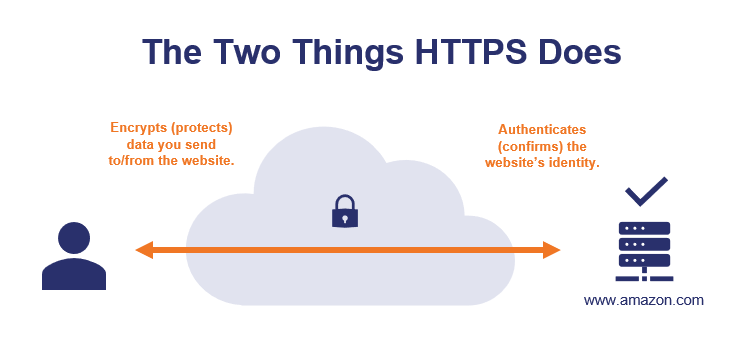Unveiling the Significance of HTTPS Certificates
- June 4, 2022
- Blog, Digital Marketing Training, Website Design Development
Understanding HTTPS: The Key to Secure Web Communication
When browsing the web, you may have noticed that some websites start with “https” instead of “HTTP.” This small difference is significant and represents the presence of HTTPS, which stands for Hypertext Transfer Protocol Secure. However, it is crucial not to overlook the importance of HTTPS certificates. In this blog, we will explore HTTPS, how it works, why it is crucial for secure web communication, and delve into the process of obtaining an HTTPS certificate. By understanding the significance of HTTPS certificate importance, you can ensure a safer and more secure online experience.
HTTPS: Unveiling Secure Web Communication
HTTPS is a protocol that secures the communication between a user’s web browser and a website. It ensures that data transmitted between the two parties remain confidential and protected from unauthorized access or tampering. Additionally, the use of HTTPS certificates plays a crucial role in establishing trust and verifying the authenticity of websites. By utilizing encryption technology, HTTPS creates a secure connection, which in turn provides a safer environment for users to browse and interact with websites. For more detailed information on this topic, please refer to the following section.
How Does HTTPS Work?
HTTPS employs a combination of two key technologies: SSL (Secure Sockets Layer) and TLS (Transport Layer Security). These cryptographic protocols enable the encryption and decryption of data during transmission. Understanding the HTTPS certification importance, let’s take a simplified overview of the HTTPS process:
- Client Request: When users access a website via HTTPS, their browser initiates a secure connection request to the server hosting the site.
- Server Authentication: The server responds by sending its digital certificate, which contains a public key for encryption. The certificate is issued by a trusted third-party organization known as a Certificate Authority (CA).
- Encryption Setup: The client’s browser verifies the authenticity of the server’s certificate. If the certificate is valid and trusted, the browser generates a unique session key for encryption.
- Secure Data Transmission: Using the session key, the client and server establish an encrypted connection. All data transmitted between them ist will be encrypted, making it unreadable to anyone attempting to intercept it.
- Data Decryption: Upon receiving the encrypted data, the client’s browser uses the session key to decrypt the information, making it readable and usable.
Why is HTTPS Important?
- Data Confidentiality: HTTPS makes sure that sensitive data, such as login credentials, credit card details, or personal information, is encrypted and will be protected during transmission. This significantly reduces the risk of interception or unauthorized access.
- Authentication and Trust: HTTPS verifies the authenticity of the website through digital certificates issued by trusted CAs. This helps users verify that they are connecting to a legitimate website and not a malicious imposter.
- Data Integrity: HTTPS protects against data tampering during transmission. Any alteration or modification of the data would render the decryption process invalid, alerting the user to potential tampering attempts.
- SEO and User Trust: Search engines prioritize websites with HTTPS in their rankings, as it is a signal of trust and security. Having HTTPS instills confidence in users, making them more likely to engage with your website and share sensitive information.
- Compliance Requirements: Various regulations, such as the GDPR (General Data Protection Regulation), require the use of HTTPS when handling personal data. By implementing HTTPS, businesses can ensure compliance with these regulations and protect user privacy.
Recognizing the HTTPS certification importance, HTTPS plays a vital role in securing web communication by encrypting data, verifying website authenticity, and protecting against tampering. Its importance cannot be overstated because it safeguards user privacy, builds trust, and ensures compliance with data protection regulations. As a website owner or user, prioritizing HTTPS is essential for a safer and more secure online experience. So get https certificate and not neglect the importance of HTTPS certificate
Bonus!
There are some managing tips that you need!
Leads Dubai has professional developers who can assist you in installing your https certificate. Contact us to know the process.


Mukesh Pandey is a Digital Marketing Strategist. Passionate about Digital Marketing and the trends in the industry for 10 years. He is Google Ads Certified, Social Media Ads Manager & SEO Consultant. He has trained over 500 executives & business owners over the years. Helped over 300 companies achieve their digital marketing results. He also founded Leads Dubai which is a Lead Generation Company in Dubai. Hire Mukesh for your Marketing Campaign
Contact Us
Our Services
- Google Ads
- SEO Services
- Email Marketing
- SMS Marketing
- Whatsapp Marketing
- Influencer Marketing
- Facebook Advertising
- Instagram Advertising
- Tiktok Advertising
- YouTube Advertising
- Linkedin Advertising
- Mobile App Marketing
- Pay Per Lead
- Outdoor Advertising
- Outdoor LED Ads
- Burj Khalifa Ads
- Metro Advertising
- Radio Advertising
- Newspaper Advertising
- Flyer Distribution
- Website Development
- Social Media Content Creation
Blog Categories
- Advertisement (12)
- Blog (416)
- Content marketing (4)
- digital marketing (1)
- Digital Marketing (19)
- Digital Marketing Training (7)
- Email Marketing (19)
- Facebook (40)
- Google Ads (62)
- Infographics (42)
- Instagram (9)
- Marketing Agency (3)
- Mobile Marketing (17)
- Outdoor Advertising (48)
- Press Release (9)
- Programmatic Advertising (1)
- Radio Advertising (1)
- SEO (42)
- Social Media Marketing (54)
- Testimonials (38)
- Website Design Development (15)
- Youtube (4)






















